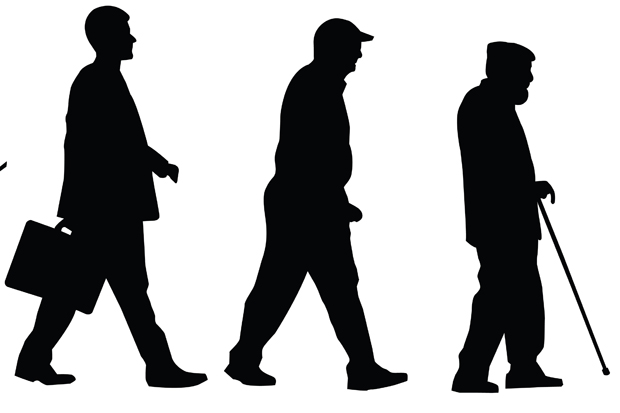‘Welcome, Mr Chancellor, to the Age UK community,’ said the voice. It was a warm, friendly woman’s voice, but bearing a chilling message. At 76, I willingly accept that I am no longer young, but I don’t want to belong to a club for which old age is the only membership qualification. I don’t want to cross the Rubicon into an alien, exclusive territory.
Ageing doesn’t strike suddenly. It is a gradual process that starts very young. I remember, when I hit 30, how keenly I felt the loss of my youth, and it really did mark the beginning of decline. By the time I reached 40, I couldn’t read a London street map at night without getting out of the car and standing under a street lamp. So I got reading glasses, which were replaced within a few years by bifocals after television images also became blurred.
I was 47 when the Independent newspaper made me its first Washington correspondent; and I was filling in an American visa form in a London restaurant when Matthew Symonds, one of its founders, joined me for lunch. My pen was poised at that moment to fill in a box marked ‘Colour of hair’, and I asked Matthew what I should put. ‘Don’t fool yourself,’ he said. ‘Grey.’ Now it’s white.
Thereafter the common symptoms of ageing accumulated. There were the usual dental problems — crowns, bridges, tooth implants — and the diseases given you in punishment for bad habits like smoking or drinking — chronic bronchitis, diabetes, and so on. And then comes loss of hearing, which is one of the most annoying afflictions of the old. By the time I had reached my sixties, this had become a problem for me as well; but luckily people now make very efficient hearing aids, which are also so small that they are almost unnoticeable. The Danes seem to be specialists at this.
This may sound a depressing list, but the good news is that it’s not in itself enough to stop you in your stride. It takes more than the conventional symptoms of ageing to make you incompetent at sedentary work, or to thrust you into the embrace of the Age UK community. For that you need something extra to happen to you, and in my case it was bleeding on the brain.
The fear after one haemorrhage is that another will follow it, and so you are told you shouldn’t be alone during your recovery. But if you want to disregard this advice, this is where Age UK comes in useful. It will, for a price, furnish you with a ‘personal alarm’ in the form of a pendant hanging around your neck that you can press for help. This used to be advertised in the newspapers by a picture of an elderly woman sprawled at the bottom of a staircase over a caption reading ‘Mrs Hope knows help is coming …but would you?’
If you are in Mrs Hope’s situation, you press the button on the pendant and a bell rings at Age UK, which then calls a neighbour to come and rescue you. You’ve needed a neighbour in the first place to install the equipment to make it work, for the pendant comes with a base station and a mass of wires and plugs that would defeat any but the sharpest minds. But once this is installed, the system works well. The people at Age UK are at their posts all day and night throughout the year, ready to offer you reassurance and comfort as a member of their community.
Your independence is not, however, unqualified. You have to remain within range of the base station for the system to work. The chickens are near enough to the house for me to get help when feeding them, but the ducks on the pond are too far away. They will have to starve. But I don’t really expect to fall like poor Mrs Hope (who incidentally seems to have vanished from the scene). I see my membership of the Age UK community as the kind of insurance one takes up to protect oneself from anything nasty happening, for one knows that any insurance company will do its damnedest to ensure that you will never make a claim.
Got something to add? Join the discussion and comment below.
Get 10 issues for just $10
Subscribe to The Spectator Australia today for the next 10 magazine issues, plus full online access, for just $10.
You might disagree with half of it, but you’ll enjoy reading all of it. Try your first month for free, then just $2 a week for the remainder of your first year.













Comments
Don't miss out
Join the conversation with other Spectator Australia readers. Subscribe to leave a comment.
SUBSCRIBEAlready a subscriber? Log in